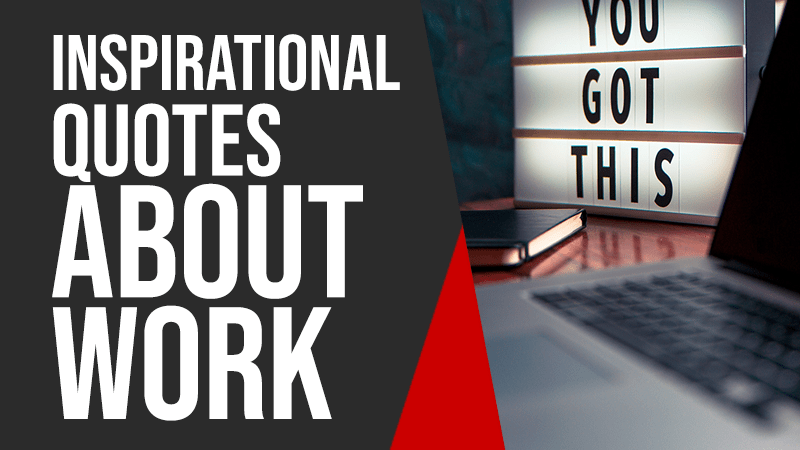6 Inspirational Quotes About Work That We Can Use Everyday
Share this content :

People often look at me and think that, as a self-made millionaire, I’m someone who doesn’t need any inspiration. In their minds, I’ve already made it to the top and know the tricks of the business. The truth is that I honestly don’t see myself that way. I grew up with a single parent who worked daily to provide for me. My brother gave up school so that he could work and make sure we had a meal every day. That dedication alone inspired me to be more and do what I could to give back.
Even now, I still need the inspiration to work hard at times. That’s why I’ve listened to the greatest minds and behavioral experts. Through their insights, I made choices to survive. From these experts, here are six inspirational quotes about work that you can apply to your life.
1. William H. McRaven
“If you want to change the world, start off by making your bed. If you make your bed every morning, you will have accomplished the first task of the day.”
Who Said It:
Admiral William H. McRaven is a former Navy Seal and former commander of the US Special Forces. After his military service, McRaven gave a memorable speech for the University of Texas in 2014. During the said speech, McRaven outlined his time training as a Navy Seal and the importance of routine and the will to excel.
His memorable words would eventually lead to him writing the book “Make Your Bed: Little Things That Can Change Your Life…And Maybe the World”, which ultimately became a New York Times bestseller. His words resonated with so many people as one of the most inspirational quotes about work and life.
What It Means:
Early in my life, I joined the military and learned the importance of discipline and self-control. That’s why this quote from McRaven meant so much to me. In it, he outlines the importance of making your bed as the first task of your day. Beyond making a routine, McRaven explains the importance of feeling satisfied with a job. He says that even if you end up tired or have a long day of failures, you will return to the same bed, adequately made. That means you subconsciously remind yourself that you accomplished something within that day.

I believe that kind of mentality is essential, especially when taking accountability. Too often, we tend to watch our mistakes and grieve over them. We spend so much time looking at our failures that we don’t see our small successes. I believe that if we change our mindset and celebrate what we have accomplished, however small, we can take control. If I remember that I made my bed this morning, I remember that I can do something right. As long as I know that, I can start to work harder to change my life.
How to Implement:
The simplest way to apply McRaven’s quote is to follow his exact words. Make your bed every time you wake up. The power of habit isn’t through significant and apparent milestones. It starts with little changes. You can start making your bed by folding the blanket and pillows. The following month, you can begin to fluff the pillows and straighten the sheets.
By reinforcing the habit, you can slowly get used to the motion and the action. More importantly, the more you do it, the more satisfied you’ll feel after you finish. McRaven says that even a bad day can disappear when you make it home and rest on a well-made bed.
Once you start building a routine, you can add more tasks that fit your schedule. These habits include checking your emails, preparing reports, and getting feedback on previous projects. Starting the practice now will help you increase productivity and make your work feel second nature.
Other examples include:
- Stretching your body every morning.
- Shutting off your phone an hour before sleep.
- Preparing your work clothes the night before.
2. Charles Duhigg
“The Golden Rule of Habit Change: You can’t extinguish a bad habit, you can only change it.”
Who Said It:
Charles Duhigg is a former reporter, writer, and editor of the New York Times. His work in journalism has covered the global economy, the growth of Chinese manufacturing, and the military operations in Iraq. Currently, he works as a writer for The New Yorker Magazine. He is also the bestselling author of “The Power of Habit” and “Smarter Faster Better.” In these books, he focuses on the science of productivity and how people can use habits to improve their lives for the better.
What It Means:
Not only did he leave inspirational quotes about work, Duhigg also helped others shape how you view vices and habits. Duhigg summarizes his philosophy on how people behave and how productivity works: we can’t remove bad habits. People often view vices or destructive behavior as a problem. Duhigg noted that these types of practices had cues that triggered their reaction. In other words, it wasn’t the action itself that was the problem. Instead, our reactions and choice made these bad habits occur. To change them, Duhigg noted that we had to pinpoint these cues and find alternative paths we could take once triggered.
For example, a man who eats snacks at work wants to get healthier. To change the habit, he examines what triggers these cravings at work. It turns out that whenever he looks at his daily schedule, he tends to eat because he feels overwhelmed. Now that we know how this man is reacting, we can advise him to find different reactions. He might consider meditating or going for a short walk before heading to work. That way, he’ll not only feel more relaxed when he’s at his job, but he’ll also change his bad habit into something healthy and productive.
How to Implement:
Like our example above, the key to implementing Duhigg’s idea is discovering our cues. Every human’s behavior is defined by what they expect as a reward. Those who smoke or drink do so to de-stress their lives. If this reward is the cue, then we can try and find alternatives to our usual routine.
For example, if you like to smoke or nap at work to relax, consider listening to music or doing breathing exercises. Not only will you be able to focus afterward, but you’ll also learn to change what method you rely on for relaxation slowly. With enough time and practice, you’ll find that your bad habits will change into good ones.
Other examples include:
- Instead of napping, try guided meditations.
- Instead of snacking, try a short walk down the street.
- Instead of watching videos during downtime, try listening to piano music.
3. James Clear
“Professionals stick to the schedule; amateurs let life get in the way.”
Who Said It:
James Clear is a writer and speaker who covers habit and continuous improvement topics. He penned the book “Atomic Habits,” a New York Times bestseller with over 5 million copies sold worldwide. He also has been featured in multiple news outlets like Time magazine, the Wall Street Journal, and CBS This Morning.
What It Means:
Clear believes that every human is a creature of habit. Their lifestyle and routines influence their decision-making abilities. He advocates having a system or pattern for work and self-improvement.
To make things simpler, Clear suggests breaking down all habits into simple tasks that you can achieve in under two minutes. For example, instead of saying “exercise,” focus on the practice of putting on running shoes or rolling out the yoga mat. For Clear, these simple actions can be the foundation for building an everyday routine to help you achieve your goal. Within time, you’ll put on your shoes and prepare your yoga mat for exercise as quickly as breathing.
Another important note is how Clear views the power of circumstance. Knowing when to say no and to stick to your schedule is essential. While you can occasionally celebrate, accepting invites or letting life distract you from the routine is dangerous.
As the quote above states, amateurs let life get in the way. These people are easily swayed and ignore their patterns to handle what is in front of them. Sometimes, the harshest lesson is knowing when to say no. It might be a tough pill to swallow, but inspirational quotes about work never focus on what’s easy. When you can learn to focus on your priorities instead of relaxing or wasting time, you can provide higher-quality outputs for your job.
How to Implement:
As I already said earlier, the harshest lesson is when to reject someone or something. If an event stops you from your habit, you have to say no. For Clear, being in control of your situation is key to everything.

For example, if you have to submit a paper but get invited to a party, you have to distance yourself from the occasion. If you’re going to jog, but heavy rains stop you, find an alternative exercise you can do at home. The more you learn to change your situation and refuse any diversions, you can keep better focus when fulfilling your tasks.
Other examples include:
- Plan upcoming parties and events to fit your schedule.
- Turn off your phone or mute it during work hours.
- Preparing diet-friendly snacks when you feel hungry.
4. Ryan Holiday
”No one is asking you to look at the world through rose-colored glasses.”
Who Said It:
Ryan Holiday is a writer and media strategist who advocates stoicism as a mindset for better living. His famous books include “The Obstacle Is the Way,” “Ego Is the Enemy,” and “The Daily Stoic.” Holiday also owns Brass Check, an advisory company that has worked with known entities like Google and Complex. His work has been used by multiple sports teams, such as the New England Patriots and the San Antonio Spurs.
What It Means:
Emotion can be a powerful boost and detriment to life. Holiday illustrates this with a story about John D. Rockefeller. During financial panic and disarray, Rockefeller stated that he viewed such events as “an apprenticeship to difficulty”. Holiday uses this to highlight the importance of remaining calm under pressure. Whereas Rockefeller learned to stay collected, his peers either felt the rush of the financial boom or freaked out during recessions.
Throughout this period, Rockefeller kept calm and focused on how he could benefit himself rather than getting swept up by his feelings. Holiday points this out in other famous events, like astronauts maintaining a steady heart rate while in orbit.
The point of Holiday’s examples is that he shows the power of perception. He does not believe that being overly optimistic or pessimistic is a good thing. Instead, the perception of both failure and success should be disciplined. According to Holiday, it’s how you approach a problem that you can start to make changes and better yourself.
It’s how police officers remain calm while under fire. Even though it is a traumatic situation, their training and discipline help them keep a level head and make tactical decisions. The reason why it’s one of the most inspirational quotes about work is because how it tackles the issue of being positive. Being hopeful is never bad, but it’s not wise to overlook the reality of life.
How to Implement:
In short, Holiday views every problem and scenario as an opportunity. He advises us to take that same approach and observe everything as a chance. Failures are not horrible outcomes but instructive events and openings for new solutions. When we temper our expectations and accept failure as a part of life, we can move forward and take action.
For example, if our output is rejected, we should not simply feel defeated and walk away. Instead, we should take time to review what is missing and learn from our mistakes. The same for success: if we get our proposal approved, we should take time to reflect on how we got there. What choices did we make that helped ensure the proposal’s acceptance? The more we adjust our view on results as a chance to improve, the more effective we can make our decisions and habits.
Other examples include:
- Listen to constructive feedback from superiors and colleagues.
- Write down what you achieved or didn’t achieve and re-read it at night.
- Take a moment to step back and reflect on the situation, be it work conflicts or revisions.
5. You are a perfectionist
“Risk comes from not knowing what you are doing.”
Who Said It:
Warren Buffett is one of the wealthiest people in the entire world. That’s not an exaggeration. An investor at an early age, Buffett developed a keen interest in stocks and the stock market system. He would eventually purchase the majority stake in Berkshire Hathaway in 1965. His ownership would amass a fortune that would earn him the nickname “Oracle of Omaha.” In fact, as of June 2022, his net profits are reported to be $100 billion.
What It Means:
Buffett’s line of work dealt with risk management. The stock trade required careful planning and foresight. Making the right choice at the right time was difficult. However, Buffett managed to earn well despite the predictions. Why?
Simply put, Warren Buffett’s most significant investment is always in himself. He consistently studies and learns about the stocks and the different fields of investment he finds himself in. He also invests in a company based on its market value. Instead, he focuses on the quality of work they provide and their productivity style as a whole. For Buffett, the risk involved isn’t a matter of faith or luck; it’s about knowing what you are paying for and what you plan to invest in. When looking for inspirational quotes about work, you’ll find many like Buffett’s, focusing on your power as a dedicated person.
How to Implement:
Buffett’s approach to life is simple: know what you’re getting yourself into. However, he doesn’t talk about specialization. Buffett consistently learns what he can about the companies he wants to invest in or trade for. We can also apply this mindset to ourselves.
For example, I made a living through real estate and sales. However, I don’t want to stop there. I want to learn more and expand my skill set to other ventures, like digital marketing and escrow planning. By providing myself with new skills, I can challenge myself to surpass my limits.
You can also apply this to any venture you have in life. Whether you have a hobby or a side hustle, your actual task is to expand your understanding. For example, learning to play guitar doesn’t end with knowing the chords. You can further practice songs, melodies, and short solos. With time, you might even perform your own music.

Other examples include:
- Take online classes on entrepreneurship, like affiliate marketing and SEO.
- Listen to lectures about self-improvement to find different techniques to use.
- Read more about what you like. Explore titles that intrigue you and see what you can learn.
6. Bill Gates
“We all need people who will give us feedback. That’s how we improve.”
Who Said It:
I’m pretty sure everyone has heard the name of Bill Gates at least once. A co-founder of Microsoft alongside Steve Ballimer, Gates is why computer software is in its current state. He helped develop the Windows operating system in all iterations, including the one you might be using now.
Aside from computers, Gates has expanded his business to cover gaming, word processing, and entertainment systems. Though he left the board of Microsoft in 2020, Bill still makes significant changes through his philanthropic pursuits, such as the Bill & Melinda Foundation. He’s made multiple contributions to society, not the least of which are his inspirational quotes about work.
What It Means:
Like Warren Buffett, Gates always believed in the power of learning and self-improvement. He never enjoyed feeling idle in any pursuit. Whether developing the Windows system or contributing to the fight against cancer, Gates always looked for new ways to work. More importantly, he heard the feedback of those he trusted.
Gates was known for being candid and insulting those who did poorly at their jobs. However, remember that Gates also accepted the importance of learning. The more he ventured into business and philanthropy, the more he understood that he had to keep an open mind to the responses. One of his other famous quotes was, “Your most unhappy customers are your greatest source of learning.”
For me, the best part about feedback is that I can hear the perspective of others. It’s not fair to assume that I’m the only one who is right. However, the only way I can understand and learn is by hearing the perspectives of others. By finding out their viewpoints and their ideas, I can remember and give advice accordingly. I think this is important for every team. Everyone should be able to contribute and lend their perspective to any decision. Through feedback, I can learn with my team what to change and improve our strategies.
How to Implement:
Implementing Gates’ idea of feedback and response is easy. All you have to do is ask and listen. Many people hear thoughts, but a learner needs to pay attention to the words. If that person understands what is said, they can learn something new about their approach. For example, if I write a template for a book, I don’t want to publish it immediately. I want to listen to the feedback of other writers, editors, and marketing experts. With their words, I can understand how to improve my style and make my book more appealing to others. You can apply this at work, too. If you have an idea of how you can improve your company or routine, share it.
Others can help you see things you might not notice, like possible flaws or the practicality of your idea.
Other examples include:
- Speak to your colleagues about your project and ask them to review it.
- Re-read your output and check what can be fixed.
- Consult a professional or senior for tips on improving a project or task.
Share this content :
Copyright © 2023 Munif Ali. All rights reserved.

